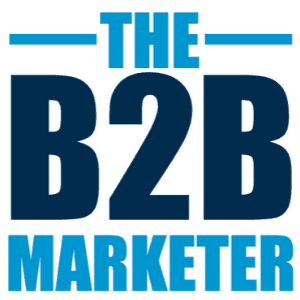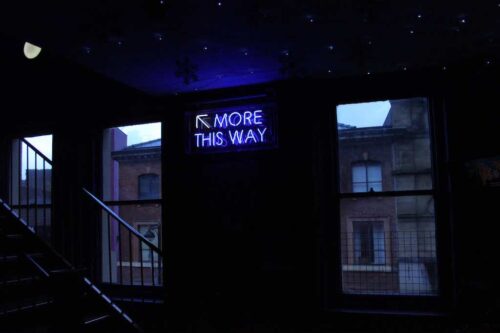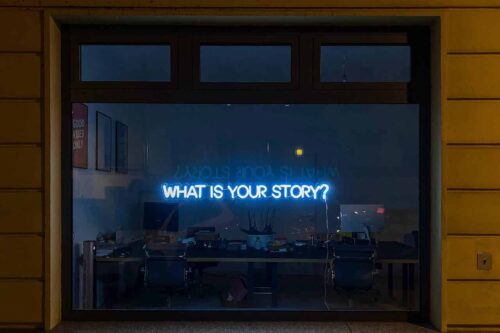In this blog post I’m going to set out to answer the following question:
As a B2B consulting business should you be on social media, and if so, which one(s)?
Let's start at the beginning...
Should you be on social media?
I’m not sure owners and leaders of B2B consulting businesses ask themselves this question enough.
Instead, their primary driver to be on social media is based on little more that the fear of missing out - or FOMO for short.
This often results in them creating a presence on multiple social media platforms with absolutely no strategy whatsoever.
As I always say, the secret to marketing success is to be consistent, persistent and patient.
To get any results from a marketing channel - and social media is just that, a marketing channel - you need to work it hard.
You need to be committed.
That’s why I also always say that you should choose marketing channels that you think you will enjoy.
Otherwise you’ll have no hope of being consistent, persistent and patient.
Whilst Woody Allen said...
80% of life is showing up
...that won't cut it on social media platforms!
Social media benefits
Social media simply provides an opportunity to network with people just as you would at a real-world event, only its in the online rather than real-world.
There are two specific benefits that social media brings over traditional in-person events.
The first is reach.
Social media effectively allows you to attend multiple networking events all at the same time!
And due to the more persistent life-cycle of a post, for example, your presence exists beyond just the hour or two that you might ordinarily spend at a real-world event.
This reach also extends beyond traditional geographic boundaries.
Whilst you might be prepared to travel for up to a couple of hours to get to a networking event, social media enables you to have a presence globally!
Secondly, social media allows you to be very targeted.
Whereas there’s always a risk at an in-person networking event of bumping into yet another life coach or holistic healer(!), social media allows you to be in places where only your ideal clients are likely to be.
That means kissing a lot fewer frogs, so to speak!
What we must remember as B2B consultants, though, is that whilst social media allows us to network online, the only intent must be to advance the conversation from online to in-person.
How many platforms?
So, we’re clear that being on social media is beneficial, but which platforms should you be on - all of them, or just one or two?
Before I answer this question, let me share my experiences using multiple social media platforms for my consulting business.
When I first ventured into social media, I had a presence on the most obvious channels.
These were, in order, Linkedin, Twitter and Facebook.
In time I extended this to include Medium.
As these platforms evolved, new features and capabilities were added.
Before long, I was running groups on Linkedin and Facebook.
On Linkedin I had my personal profile (with roughly 5,000 connections), company pages, and my own group to manage, as well as being in multiple groups managed by others.
On Facebook I had a Public Profile page, a company page, and a group to manage.
And on Twitter I had about 1,000 followers to feed with new content.
Coming up with content to publish on these profiles was time consuming, whether it was curating content or writing blog articles like this one.
Then, of course, with your own groups there is the need to moderate posts.
And across all of your profiles, to get any benefit from social media, you need to be… well, social!
That means responding to people who comment on your posts, as well as engaging in the posts of others.
The latter being something that too few people do. Instead, they just blast out their own messages, often across multiple platforms.
Social media advertising
I also started advertising on both Facebook and Linkedin, which dramatically increased the complexity of what I was doing.
I now had to create landing pages, 'thank you' pages, integration with my email marketing solution, and so on.
As well as learning the platforms (of which Facebook is the most complex by far), I also had to contend with integration to many other platforms and tools that I use.
All of this resulted in the need for continual deep analysis of results to ensure that my advertising investments were performing as expected, and that my efforts were producing a return.
This required further tools to learn, data to be crunched, and Excel spreadsheets to be created (I mean, what consultant doesn’t love an Excel spreadsheet?).
But before long, I was spending a significant proportion of my time simply managing my social media presence.
More time than I was spending on all other marketing channels combined.
My experiences across four social media platforms
Over a period of 18 months I went heavy on social media. Trying as many different platforms, and as many different features and capabilities of those platforms, as I could.
And when I say ‘try’, I don’t mean dabble.
I learnt to use the different features, and put into deep practice everything that I was learning.
So, here’s what I found out…
Overview
The de facto platform to be on for a B2B business.
Whilst once purely the land of online CV’s, Linkedin has evolved significantly and is no longer swamped with only recruitment agents!
History
Linkedin was traditionally all about connecting with people that you knew.
If that’s all you’re doing with it right now, I’d suggest you either learn how to utilise it properly, or leave the platform altogether.
Simply keeping in touch with only the people you already know is a bit like buying a Porsche and never getting out of first gear or going above 30mph.
“But Linkedin says you must only connect with people that you know”, I hear you say. If that’s really true, why are you allowed 30,000 connections!?
Real-world experience
Linkedin is the one social media platform that I can directly attribute to winning work without needing to spend money on ads. 'Nuff said!
Ok, there's a bit more to say than just that!
Linkedin is a great platform for engaging with people, and I particularly like how it enables you to extend your reach in ways that Facebook doesn’t come near to.
For example, you can see trending topics with the help of Linkedin Editors, the Content Suggestions feature (for company pages), and the ‘Today’s News and Views’ feature.
These features help you find the right content to curate, and to join the conversations of 3rd-party connections.
Reasons to be on it?
Your prospects and clients are on there, and they make it very obvious by telling you their job title for a start!
You’d be a fool not to be on it and to exploit this information.
Reasons not to be on it?
If you have so much opportunity coming from your current marketing channels, and the ability to scale your business (not just survive), then you need to seriously question if learning how to effectively use Linkedin, and then putting that learning into action, will be worth more than what you’re currently doing.
Overview
Platform of the stars.
Or more specifically, people who like to brag about themselves, their seemingly perfect lives, and their material possessions.
Ok, there is more to it than that. But I’ll be honest with you, I still don’t get where Twitter provides ROI for a B2B consultancy.
History
Some time back now Twitter doubled the length of posts, which made it much easier to make meaningful posts on there.
Growth in Twitter users has slowed significantly in recent years, with some believing it has reached its natural limit.
Real-world experience
The platform has lots of debate, particularly as it is favoured by politicians and celebrities. This does tend to result in less professional forms of engagement.
Despite that, I ran my Twitter account for a number of years and I never experienced any negativity on any of my posts.
Whilst I knew a few blue-chip consulting clients that were on Twitter, I can’t think of ever having a conversation with a client about connecting with each other on the platform.
Reasons to be on it?
If you already have a lot of followers, and you get engagement on your posts or you can prove that it drives visitors to your website and content, then I’d continue using it.
Reasons not to be on it?
You’ve currently got less than 1,000 followers and your engagement is very limited. Instead, I’d focus your efforts elsewhere.
Overview
Once the platform to see what your long lost school friend had for breakfast this morning, Facebook has changed and continues to rapidly evolve.
Whilst for most B2B businesses, Facebook used to be a no-go platform, facebook advertising changed all of that.
You can now see that all the major consultancies have a presence, including the likes of McKinsey, PWC, BCG, Deloitte, etc.
History
Things changed somewhat with the Cambridge Analytica scandal, not least the cost of advertising.
Analysis in 2018 by The Street showed that ad costs had increased by 43% over 5 quarters, whereas ad impression had shrunk from 49% to 4%. That’s some radical shifts.
I don’t know about you, but I don’t look at my Facebook feed half as much now as what I used to.
The feed has changed so much that it’s mostly ads and group posts.
And that’s where Facebook’s focus now is - on creating more intimate engagement, mostly through groups.
Real-world experience
I’ve done pretty much everything there is to do on Facebook. From company pages, groups, public profile pages, advertising, video, content curation, and so on.
Probably one of my more memorable experiences was when running my facebook group.
I ejected a guy because of an offensive post. In return he was able to give my Public Profile a 1-star review, along with the comment, “Stop being such an arrogant prick.”
Facebook makes it really difficult to contact anyone for support (unlike Linkedin), and there was no way that I could get the 1-star rating removed, although I was able to delete the comment. (In hindsight, I wish I hadn’t as the comment provided validation that the rating was silly).
Reasons to be on it?
Advertising - plain and simple.
Why advertise on Facebook? Exposure.
The average time people spend on Linkedin is 17 minutes per month versus nearly 1hr per day on Facebook!
That’s a lot more potential eyeballs on your ads.
Reasons not to be on it?
You have an addictive personality and you enjoy thumbing through pages and pages of banal highlight reel posts from shallow people. If that describes you, Facebook won’t help improve your condition!
Overview
Medium is an online blogging platform where people can comment upon and ‘clap’ articles.
History
Medium was created by one of the Twitter co-founders as a platform to get over the 140 character limitation (now 280) of Twitter.
Medium’s focus is reportedly to increase the time users spend on content rather than simply increasing total viewers of content.
Real-world experience
I initially found Medium to be a useful platform for finding content to curate elsewhere.
I like the style of the posts that appear on the site, and engagement on articles is always professional.
I never wrote articles specifically for Medium as it has the ability to post using a "rel=nofollow".
This is important to allow you to post the same content on your website without it being penalised by Google for duplicate content (and is a feature that is sorely missing from publishing articles on Linkedin).
Reasons to be on it?
You have a burning desire to be a real-world author - that is, you want to get paid to write.
Medium is a great platform for building an audience if that is your desire.
Reasons not to be on it?
If you’re writing solely for B2B then it will take forever to get traction on the profile, and I’m not entirely sure what return you’d get for that effort.
Social Media Groups
Now, just before we move on, let’s have a quick discussion about groups.
Facebook groups
I’ve already mentioned that Facebook is putting a lot more emphasis into groups. And there’s a high chance that if you’re on Facebook, you’re probably in some groups already.
Whether it’s your local ‘Items for Sale’ group, or town news, or because you signed up to someone’s free 5-day mini-course, you’re probably already experiencing the power of Facebook groups.
What I really like about Facebook groups is the number of features, such as:
- The ability to run polls
- High character limit
- Post scheduling
- The ability to post as a Public Profile (although you can now do something similar in Linkedin)
- And many more
The net result of these features is that Facebook groups get really good engagement.
The downside is that the business owners attracted to Facebook tend to be at the smaller end of the scale - mostly solopreneurs.
The problem with many solopreneurs is that they have a consumer mindset, and often behave in consumer-like ways.
What I mean by this is that they want to talk discounts; they have no problem advertising their competing services in your group; they’ll be happy to muscle in on your highly moderated group because they have a scarcity mindset and are too lazy to create their own group.
In short, I found running a Facebook group to be quite disagreeable!
Whilst there was more good than bad in respect to engagement, and I created some long-term connections from it, after running a group for about a year and spending probably an hour a day on it on average, it didn’t result in a single sale!
Linkedin groups
Now, Linkedin groups are another thing altogether.
Engagement in Linkedin groups is woeful in comparison to Facebook groups!
They’re also spammed to death.
But they do have a very powerful use.
You see, Linkedin groups tend to be massive. Bigger than Facebook groups. And they’re very targeted.
Facebook groups tend to be all about moving people along a sales funnel. Because of that, the sharing of your valuable content, such as blog articles and guides, etc. in other people’s groups tends to be culturally unacceptable.
This is not the case with Linkedin groups.
So the way I like to use Linkedin groups is as a distribution platform.
For example, when I write blog articles - such as this one - I’ll share it in about 10 relevant Linkedin groups.
Not only does this increase views of my blog articles, but it’s also responsible for about a third of the people who have signed up to my mailing list.
It can also result in an increased number of Linkedin connections.
Another key feature of Linkedin groups is that you can message people who are in the same group as you (dependent on their personal settings) without needing to be connected to them. This is a very powerful feature that few people make any use of.
So Linkedin groups are great for content distribution, for sending targeted messages, and for building your email list.
The downside to Linkedin groups is that you just don’t get that much engagement, and it’s really common for people to use your group to publish their own promotional material.
I ran my own group on Linkedin for about 2 years, and I drove membership in part through my ‘Thank you page’ after someone downloaded a lead magnet.
In total I had about 250 members. That's around half what I achieved in Facebook in less time, and a tiny fraction of the membership of the other groups that I am in.
For example, the smallest membership of the Linkedin groups that I am in has over 7k members, and the largest has almost half a million!
I eventually deleted my group due to a lack of engagement, and because I was getting more traction leveraging the much larger groups created by others.
How many platforms should you be on?
Herein lies one of the biggest mistakes I see people making with their social media presence.
Due to FOMO, they create accounts on all the main platforms.
They might even go so far as to create accounts on slightly left-field platforms like Instagram.
But I ask, what’s the point?
Go back to why you’re even on these platforms.
It’s to network. To engage with people. To demonstrate that you’re an expert and to become a trusted authority in your niche. It's about driving people from the online world into the real-world and getting them on the phone or at an in-person meeting.
For that to happen you need to engage.
And to maximise your engagement, and the benefits that you can get from a platform, you really must learn all there is about each platform.
Let's look at in another way.
If you’re like most businesses, you’ll be using a few different marketing channels - like in-person networking, a website, maybe doing business exhibitions.
We'll take exhibitions as an example.
You’ve decided that it's a channel that’s right for you. What you then naturally do is identify which exhibitions will be of most value to you. You don’t go to every single exhibition that there is.
Yet when it comes to social media, that's exactly what people do. They want to go to them all!
They’re convinced by the scare mongering that a platform might disappear overnight, or their account will be blocked and without a back-up profile on another social media platform, they’ll be ruined!
I say the likelihood of those things happening are very rare indeed.
What's more likely is that you create a presence on too many platforms and end up with fragmented efforts that result in zero return on investment.
I say that you should master one platform, and the best B2B platform to master right now is Linkedin.
If you’re going to venture into running social media ad campaigns, then Facebook might be a useful platform, but I’d test to see if you can get the results from Linkedin advertising first.
Don’t believe the hype that Linkedin ads are way more expensive than Facebook - in my own testing I was able to get lead cost identical on Linkedin to Facebook at £3.50 per lead.
So which is it?
At the beginning of this article I said I’d set out to answer the question:
As a B2B consulting business should you be on social media, and if so, which one(s)?
The answer is yes, you should use social media, and your platform of choice should be Linkedin.
Only once you feel you’ve exhausted Linkedin's potential, or spent maybe as much as a year proving that it’s not right for your business, then I’d say consider another channel.
Why do I say a year?
Because all marketing channels take time, and social media channels take a lot of long-term investment. As you'll recall from the beginning of this post, you need to be consistent, persistent and patient!
What about advertising - won't that speed things up?
If you’re going to consider advertising on social media, whilst the vast majority of people say to use Facebook ads, for B2B I’d test Linkedin ads first.
The reasons being that: a) the targeting is much more relevant; b) I found the costs to be comparable; and c) the interface is far less confusing than Facebook's.
However, before spending a penny on paid advertising, I’d first build a big audience at nil cost (except for time) on Linkedin. Then I would test my 'ads' by way of making posts on my time line. This would enable me to identify the best posts (the copy, the imagery, and the offer) based on which one's get engagement.
Only then would I put money behind those posts that I'd proven to work!
And finally, I'd then test Linkedin ads first, before moving on to Facebook ads.
WARNING: Remember there’s an entire industry built on people selling courses and services in Facebook advertising. Like selling shovels in a gold rush. I’ve spent a lot of money with a few different people in this space, and I’m at risk of repeating myself here, but test your ads with organic posts on Linkedin first. To engage in Facebook advertising without proving your ads beforehand is foolhardy!





